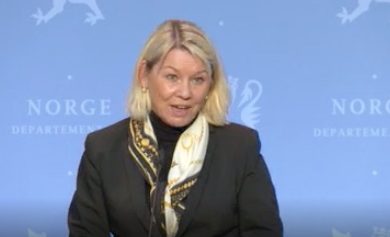Justice Minister Monica Mæland confirmed on Wednesday that the government won’t resort to curfews to control Corona virus infection, at least not now. She defended the government’s need to explore the option, however, after that decision alone was met with widespread criticism during a hearing round that just ended.

Mæland said at a press conference Wednesday that the prospect of curfews has, “understandably enough, generated lots of response and much debate.” She also said that some interested parties have asked for more time to respond and received extensions of the Sunday deadline.
“We will work through all the response before we eventually send a proposal (regarding curfews) to the Parliament,” Mæland said.
She quickly added that “no curfew (called portforbud in Norwegian) will be imposed now,” but stressed that it was important to examine the legal foundation for curfews if the Corona situation becomes much more serious.
“Our job is to think through the worst possible scenarios,” Mæland said, “but we hope they never occur.”
Health officials disagree among themselves
Some state health officials, including Health Director Bjørn Guldvog, think the Parliament should grant authority to impose curfews if deemed necessary. “Situations can arise in which the public health is threatened and it’s not possible to address it with other measures,” Guldvog told Norwegian Broadcasting (NRK) in explaining why his state directorate supports the proposal to make changes in Norway’s infection protection law. Allowing curfews, he thinks, could be useful as a new tool for handling the pandemic.
He thus thinks the government should be able to forbid anyone and everyone from gathering in public places as a means of preventing the spread of infection. He stressed that could only happen if a curfew is determined to be “strictly necessary.”
Many others including the state public health institute FHI, a long list of top politicians, professors and even the police are skeptical if not firmly opposed. FHI doesn’t think curfews would help hinder infection very much, while other objections are more dramatic. “You’d be sending a signal to folks that their homes could be used as a prison,” Trine Skei Grande, leader of the Liberal Party and a former government minister, told NRK.
Could weaken public confidence
The police, meanwhile, contended in a written response during the hearing process, that curfews amount to “a violation of the general contract in Norway between the authorities and citizens that’s based on mutual trust.” Police officials also worry that the challenges involved in enforcing curfews could weaken public confidence in the police.
Several other countries in Europe have used curfews as a means of battling the Corona virus, including Turkey, France and Greece. Grande contended that many have had problems with both enforcement and consenquences, even though ambassadors of European countries that have imposed curfews defend the practice. Some ambassadors in Norway have seemed offended by the Norwegian debate over curfews, especially after several Norwegian professors noted how most of the countries imposing curfews have undergone periods of dictatorship.
‘Extreme measure’
Newspaper Aftenposten editorialized against curfews on Wednesday, given all the harsh criticism and one local lawyer’s assertion that a curfew “would be an extreme measure” the likes of which hasn’t been seen in Norway since the Nazi German occupation during World War II. Aftenposten, Norway’s largest newspaper, also can’t see an infection situation where invasive measures already imposed in Norway wouldn’t help.
“The public has so far dealt well with all the infection prevention measures,” Aftenposten wrote. “There hasn’t been any major opposition to them and confidence in the authorities remains high. That’s good.” There’s thus no pressing need for curfews, the paper editorialized.
“It was correct to draft the possibility, but making curfews a tool when opposition is so strong can contribute to weakening public confidence both in the authorities and the infection prevention measures,” Aftenposten concluded. “The proposal should therefore be set aside.”
NewsInEnglish.no/Nina Berglund

